Reviews
Les herbes folles
Alain Resnais
France, 2009
Credits
Review by Cullen Gallagher
Posted on 03 October 2009
Source 35mm print
Categories The 47th New York Film Festival
At the dramatic climax of Alain Resnais’ Wild Grass, the central male protagonist finds himself in an awkward position that offers no easy solutions: his boxer shorts have gotten caught in his zipper. It’s a far cry from the existential crises at the heart of his most famous films, Hiroshima, Mon Amour and Last Year at Marienbad, and it’s emblematic of a major shift away from the esoteric that his work has taken (particularly noticeable in his films from the 1980s, such as I Want to Go Home, as well as the recent Private Fears in Public Places). This, however, is not meant to imply that Resnais’ creativity has been tamed in the least; instead, as its title suggests, there’s an irrepressible whimsy to Wild Grass, some mysterious force that keeps shifting the movie into unexpected territory. The ever-playful Resnais continually reinvents his movie throughout the story’s progression (quite literally up until the last frame, with a truly bizarre final shot!) with red herrings, plot reversals, false endings, and other sudden tonal shifts. At age 87, and with over sixty years of directing behind him, Resnais is still one step ahead of the audience, and his filmmaking remains as vigorous and youthful as ever.
Resnais regulars André Dussollier (seven films together) and Sabine Azéma (nine films together) reunite in this screwball comedy about two strangers whom fate has thrown together, and even though they absolutely aren’t meant for each other, they can’t seem to stay apart, either. After Azéma’s purse is stolen by a rollerblading thief, Dussollier finds her empty wallet under his car across town. While looking for identification, he comes across her pilot’s license and is love-struck over her picture with aviator’s goggles. Turning the wallet in to the police, he constructs an elaborate fantasy revolving around her gratitude (even though he is already married). When she merely calls to say, “Thanks,†however, he is crushed and begins sending her letters, leaving long messages on her answering machine, and even slashing her tires. Initially perturbed, Azéma informs the police, but soon finds herself similarly making late-night calls to his house, and hiding outside of movie theaters waiting for him to emerge.
Obsession is frequently a strong theme in screwball comedy, which has never been one of the safest of genres, what with its frequent pratfalls, arrests, divorces, fights, revenge fantasies, and other emotional torrents (these incidents culled from Bringing Up Baby and The Philadelphia Story). While Wild Grass does dig into the uncomfortable underpinnings of the screwball spirit - suggestions of Dussollier’s homicidal impulses and fear of the police are never fully explained, nor is Azéma’s nihilistic angst remedied (though her preoccupation with Dussollier seems to have distracted her for the moment) - Resnais does so only with the lightest of touches. The humor is hard to pin down, but it is irrefutably present throughout. Perhaps it lies in the characters’ contradictory persistence and resistance: their parlay of intricate plans to win the affections of one another are thwarted by their stubborn refusal to give in so easily.
However, comedy’s elusive complexity is rarely reducible to just one such element. There’s also Resnais’ swift, spirited excursions into other genres, sometimes lasting for as little as two or three rapid shots: horror, slapstick, action, romance, war, and the musical are all referenced at different points. Even the voiceover narration shows this same fractured sensibility, split between omniscient third-person and intimate first-person: much like J.P. Donleavy’s groundbreaking novel The Ginger Man, the intrusion of a character’s unexpected thoughts onto the everyday world can yield surprising (and sometimes shocking) results.
What do we expect of aging directors? An elegiac swansong, such as Akira Kurosawa’s Madadayo, that self-consciously explores age and approaching death? Or something like Ingmar Bergman’s Saraband, in which the director reunites with long-time actors to revive characters and stories begun three decades earlier? Maybe Eric Rohmer’s The Romance of Astrea and Celadon, so consistent with the director’s inimitable styles and themes that it could have been made at any point in his career? What these movies all share in common with Wild Grass is that their makers were all octogenarians with decades of international success behind them. At least in the case of Kurosawa and Bergman, these turned out to be their last features, and rumor has it that Rohmer’s may indeed be his final film. I don’t at all hope that this will be the case for Resnais (or Rohmer, for that matter). Instead, I draw this comparison to show that Resnais has diverged from his contemporaries in continuing to expand and experiment. The thematic links to his early work (obsession, complexities of love) are undeniable, as are certain visual motifs (highly artificial lighting and set designs that emphasize the theatrical dimension’s of his style). Yet for the first time, Resnais is reversing a career long commitment to never direct an adaptation of a novel, this time working from Alex Reval and Laurent Herbiat’s script based on Christian Gailly’s novel The Incident. Just as Resnais is not content to sit still or rest on his laurels, we too must continue to refine our perceptions of him as an artist.
More The 47th New York Film Festival
-

Sweetgrass
2009 -
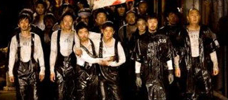
Kanikosen
2009 -

Police, Adjective
2009 -
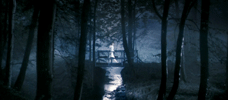
Antichrist
2009 -
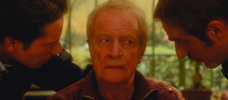
Wild Grass
2009 -

Lebanon
2009 -
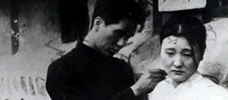
Crossroads of Youth
1934 -
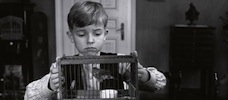
The White Ribbon
2009 -

Mother
2009 -

Min Ye
2009 -

The Art of the Steal
2009 -

In Comparison
2009
We don’t do comments anymore, but you may contact us here or find us on Twitter or Facebook.



